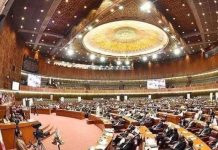DNA
KARACHI, Feb 11: Members of the Sindh Assembly (MPAs), civil society representatives, women’s rights activists, government officials, and water management experts gathered on Tuesday to emphasize the critical need to empower rural women in water resource management.
This workshop was jointly organized by the Potohar Organization for Development Advocacy (PODA) and WaterAid Pakistan at a local hotel.
The focus of the workshop was on advancing gender-responsive, inclusive, and climate-resilient approaches within the legal and policy frameworks of WASH (Water, Sanitation, and Hygiene). The event aimed to bridge existing gaps, promote women’s leadership in WASH, and ensure sustainable access to WASH services for all.
Sindh Minister for Women Development Ms. Shaheen Sher Ali served as the chief guest, and Members of the Sindh Assembly, including Ms. Tanzeela Qamrani, Ms. Nida Khuhro, and Ms. Yasmeen Shah, also attended and shared their insights. The event featured speakers such as Ms. Sameena Naazir, Executive Director of PODA, Mian Muhammad Junaid, Country Director of WaterAid Pakistan, and Ms. Raheema Panhwar from WaterAid Pakistan.
One participant from a rural area of Sindh remarked, “The idea that fetching water and managing household chores is solely a woman’s duty is an outdated belief that must end now,” underscoring the urgency to dismantle traditional gender roles that disproportionately burden women.
The consensus among attendees was clear: actively involving women in decision-making processes related to water management is not just a matter of gender equality but is essential for ensuring sustainable and effective water solutions in rural communities.
Speakers highlighted that the most climate-vulnerable communities, predominantly residing in rural areas, often lack basic facilities. These communities frequently experience extreme weather events such as floods, droughts, and heatwaves, which disrupt lives, damage livelihoods, and undermine critical infrastructure, including WASH services.
They pointed out that women and girls shoulder a disproportionate burden due to inadequate WASH services and poor sanitation, further exacerbated by traditional gender roles. Women are primarily responsible for water collection, hygiene management, and caregiving tasks, duties that become even more challenging during climate-induced disasters. Flooding, contamination of water sources, and damage to sanitation systems worsen health and hygiene issues, particularly for marginalized communities.
The workshop aimed to review existing WASH legal and policy frameworks to identify gaps and limitations in addressing gender issues and climate resilience. It also sought to promote women’s leadership, enhance climate resilience, and build awareness while fostering collaboration among stakeholders from government, civil society, academia, and the private sector to share best practices and innovative solutions.












